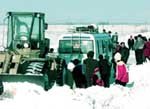Two Killed, Over 60 Injured in Blizzards in XinjiangLocal civil affairs department sources said, there are 50,000 herdsmen still stranded deep in the sea of snow in Qinghe, Fuyun and Jeminay counties, which suffered the heaviest snowstorms. They said that 63,000 herdsmen are short of food and over 5,000 households need fuel in the disaster-affected areas. The blizzards also caused the death of 4,240 head of livestock, and another 2.15 million are under threat by the extreme cold. Sources said that the snowfall is the heaviest in the Altay area in the past 50 years. The lowest temperature in the disaster-torn areas was a reported 45 degrees minus Celsius, and the depth of the snow has reached 70 centimeters in plain areas and 2.5 meters in mountainous areas, according to local meteorological sources. The Altay area, covering 117,000 square kilometers, is an important animal husbandry production base in Xinjiang. The biggest number of livestock in the area was over 4.8 million last year. The current blizzards resulted in the starvation and freezing of those animals, a major source of revenue for Altay pasture area. Groups of sheep have been seen digging in the snow trying to find dry grass. Most of the time, they failed, because serious drought and locusts last year have left almost nothing on the ground. In some areas, people usually find their clothes bitten into by goats when they walk near the animals. "There is too little fodder, and the goats are extremely hungry," said a local herdsman. The fodder he has stored has almost been eaten up by his 400 goats. The Altay area has been hit by continuous snowfall, including 22 heavy ones, in the past 100 plus days since the first snowstorm hit the area on October 18 last year. Mizan, director of the Animal Husbandry Administration of Altay area, said that they stored 940 million kilograms of grass and 96. 36 million kilograms of fodder before the coming of winter. The storage can help the area's livestock through the winter and spring in normal years, the officials said. However, the stored food will last only to the end of February because of the heavy snow. Xinhua learned that in spite of the great disaster relief efforts, the area still needs more than 23,300 tons of grass and 18,000 more tons of fodder to feed all its livestock. Meteorological sources predicted that heavy snow is also expected in the area in the early spring. |
| People's Daily Online --- http://english.peopledaily.com.cn/ |
